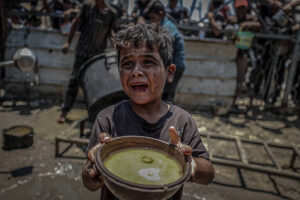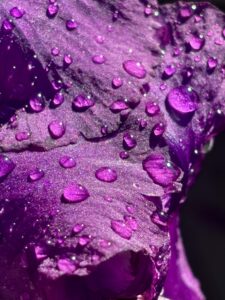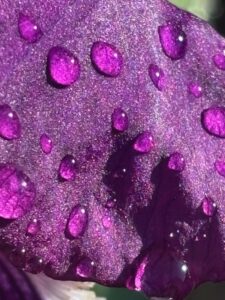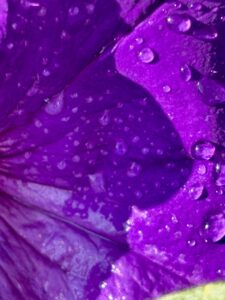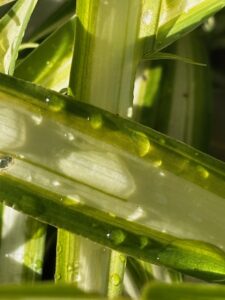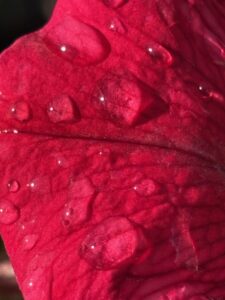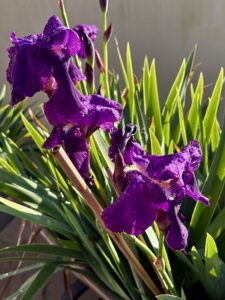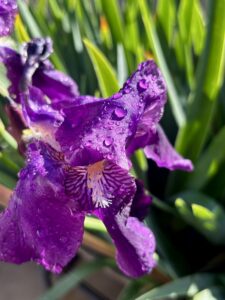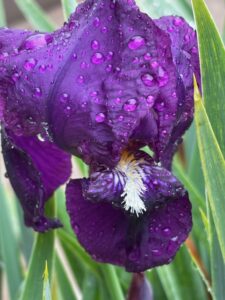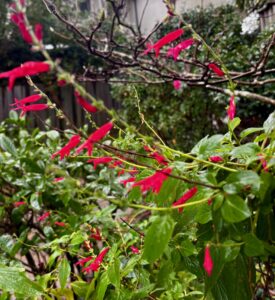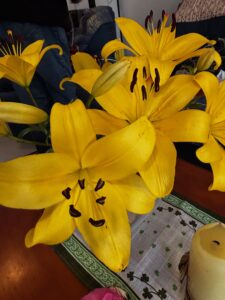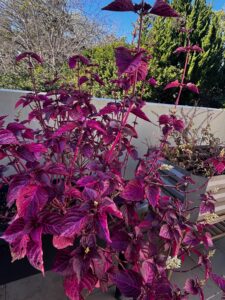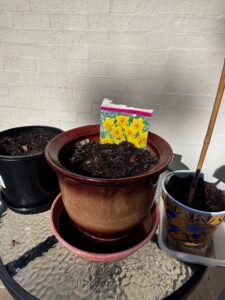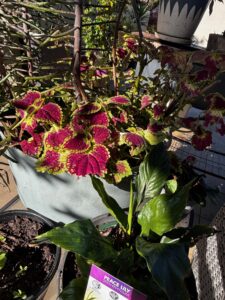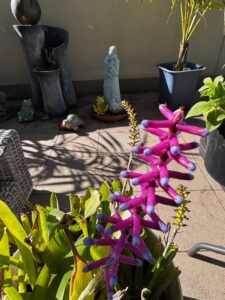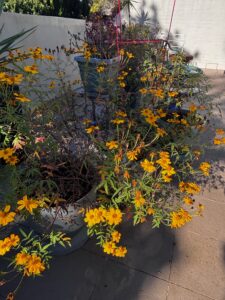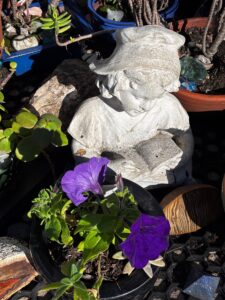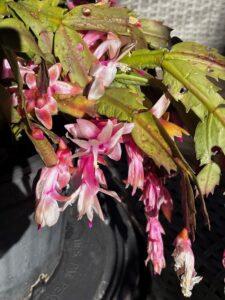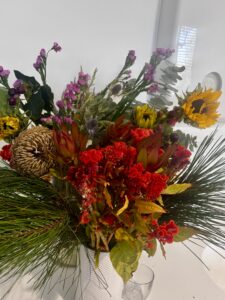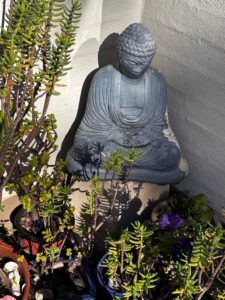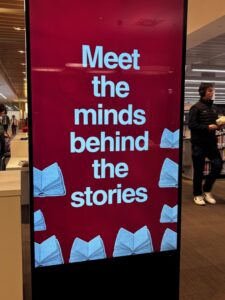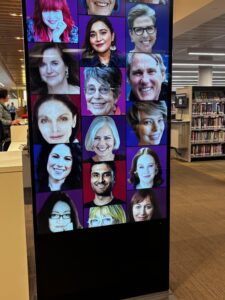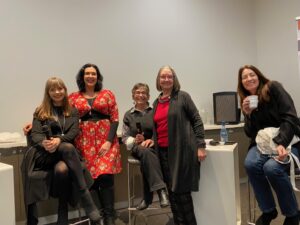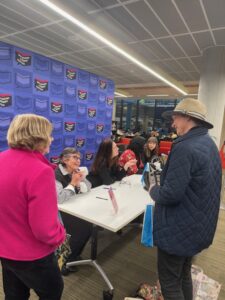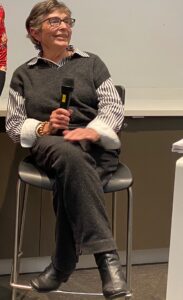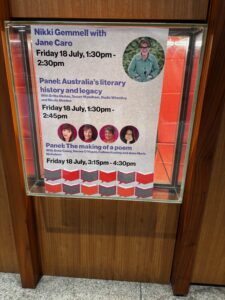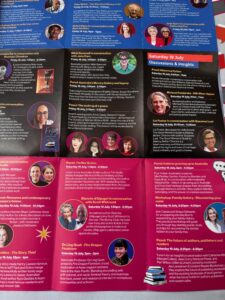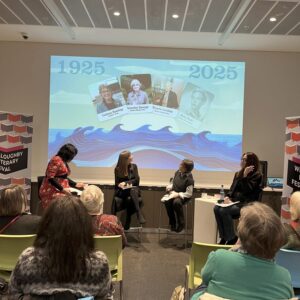
A VERY AFFIRMING REVIEW OF THE MAKING OF A POEM PANEL DISCUSSION Thank-you Anne.
Willoughby Literary Festival runs until 27 July 2025 – don’t miss it!
I’m absolutely thrilled to be part of the inaugural Willoughby Literary Festival, proudly hosted by Willoughby City Council!
The first panel discussion, I attended explored the lives and enduring influence of Shirley Hazzard, Elizabeth Harrower, and
Charmian Clift—three remarkable women who overcame challenging childhoods to leave an indelible mark on Australian literature.
Their strength, resilience, and literary brilliance were truly inspiring.
The second panel discussion, delved into the making of a poem.
While I’m not a writer, poetry has always held a special place in my heart –
its ability to distil raw emotion into just a few words never fails to move me.
Anne Casey’s poem laid bare the emotional cost of political injustice, weaving sorrow,
defiance, and the fierce endurance of the female spirit.
Colleen Keating offered a beautiful reflection on memory and family,
using a treasured recipe book to evoke warmth, nostalgia, and love
passed down through generations.
Denise O’Hagan’s The Art of Waiting captured the quiet agony
of sitting beside a seriously ill child – its imagery haunting, honest,
and unforgettable.
These three extraordinary poets – members of the Society of Women Writers,
now celebrating 100 years – left a profound impression.
Anne Greco, Willoughby Councillor
Go to the event program on the library web page and book what’s for you!
https://libraries.willoughby.nsw.gov.au/Events-and-programs/Willoughby-Literary-Festival
#WilloughbyLiteraryFestival
#WilloughbyCouncil
#WomenWriters
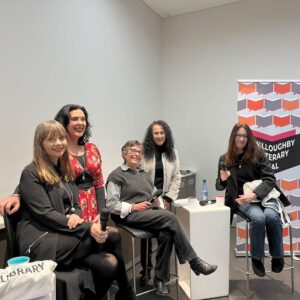
1. What was the initial impetus or idea for your poem? Did the poem begin with an image, a memory, a line, or a specific moment in your life?
My poem began with a memory. Back in 2014 .. It was a time of down-sizing selling our family home and moving into an apartment (some of you might be familiar with this uncomfortable transitional time of having to let go of much of your family story. My daughter was on a small ladder at a cupboard above the fridge and she was pulling out all my many collected cook books over a forty year period and rearing a family. My second daughter encouraging the books go into the box labelled Vinnies. She was holding them up and declaring Jamie Oliver, goes, Margaret Fulton goes, and I had to say yes let it go and when I hesitated with a book they reassured me Mum it is is all on the net now. Then they came to my mothers old cook book began by my Nanna. I know some of the cuttings fluttering between the pages dated back to 1925.
We had a break , made a pot of tea, sat down and looked through it .
My eldest daughter asked could she keep it. . Now to be real it was three old exercise books tied together . And my daughter took this old book back to England with her. after we settled I jotted down the pain of this and was the impetus for the later poem.
2. What does your writing process look like – how did this poem go from idea to first draft, and how many drafts of the poem did you make to get it to completion? Were there any elements you struggled with or resisted including?
I wrote a suite of poems about letting go of beloved things and they were published in 2016 but my struggle was finding a way of writing about an old, overused tattered book . dNothing worked for me. That was my struggle. It was a very sacred family memory and I couldn’t get it expressed. So the first draft stayed s a draft for a year or so.
Then i found the Emily Dickinson quote meeting an antique book .
And at the time I was writing this book on Hildegard of Bingen a 12th century mystic and I was researching beautiful old illuminated manuscripts of scribed calligraphy with the lapis lazuli a very valuable blue stone that they grind to make a royal blue power made into ink and very fine, thin sheets of gold and in The national Library I was given the white gloves to put on to look at their illuminated books and so the idea came to compare it to an ancient book something precious. And there was about 5 drafts I ended up taking out
they call it ‘killing your darlings’ eg i edited out about Aunty Mays upside down cake which we all loved
I have about 5 typed drafts and then it was left resting for a few years. Four years later the poem was published in a poetry magazine in 2018 .
3. Tell us about the structure and poetic devices you used and why. (I’ll also highlight some that struck me). Did you use these consciously, or did you discover you had incorporated them later? Can you point to an image or creative choice you made that surprised you?
The structure is a free verse poem. I chose not to use punctuation to create a flow that’s more like thought or emotion rather than strict grammar . kind of like breathing with the poem . Poetic devices I think the first is hyperbole where I introduce the reader to something very precious comparing it to a beautiful old manuscript.and then coming to the reality in the second stanza,
but i loved the idea that her recipes were now ‘poems of instructions’ and that coming surprised me.
and then the stream of consciousness with the allusion of sounds . . . the flutter of pages and the magpie song which lived in our back yard singing for the crumbs each day from the shaking out of the table cloth and a few crusts that she added.
the aromas and then touch with the memory of my grandmas hands guiding me and the laughter and fun of cooking.
I played with verbs eg ‘clutch’ i had fetch I wanted the association of holding something close to your heart. And not letting the truth get in the way of a good story I decided on the idea of the book coming from an old trunk rather than from a high kitchen cupboard was to give it more intrigue .
4. What helped you to know when the poem was “finished”? Do you set your poems aside for some time before declaring them finished? Do you get feedback from trusted readers?
i am fortune in belonging to two affirming poetry groups and reading it at the group is feedback for me. Hearing myself read it, aloud notice how other listen is all important. And hearing how they visualise my words is part of editing. I also have a friend with whom we exchange work to edit and spend time together pondering our work . That is invaluable .
Tense became important , I had it naturally in past tense and it was suggested to trial present tense and it became so more immediate
Also changing it from first person to second person I hoped it included the reader more i so many of us have some book or a bundle of letters that we come upon and they bring back memories . I want you my readers to relate to the poem. and maybe memories come back for you.
Finally investigating time with words . .How I take you back to the Woman’s day how they cut and glued recipes . how they wrote in the margins , the war bonds ration lists just old book marks really but there is deep sadness there too Poetry can say so much with the beautiful elastic form of time.
5. How do you go about getting your poems published? Do you have advice for aspiring poets?
Getting published is a matter of searching out places open and interested , anthologies competitions and you have to have the initiative to send your poetry off and be prepared for the knock backs or silence.
Fortunately in my poetry group we encourage each other. And it is exciting to see a new poet get their first poem published.
i was very fortunate to have my first book of poetry accepted by Ginninderra Press from South Australia . they have been supportive to poets.
Do I have advice for any aspiring poets.
1.Yes read poetry. Maybe get some poets names and find their poetry on line .
2. Know you can start now to write.
3. Carry a note book with you at all times to jot down thoughts, ideas.(maybe over a cup of coffee)
4. Write down words about something that gives you energy .
Just today you have three poems that come from our hearts. Denise very powerful experience, Anne’s family experience and my memory poem. And I hope you can hear the energy in our voices and our words.
I hope we inspire you to read and love poetry, search it out and even write.
.——————————————————————————————————————–
THE FOLLOWING POEM IS THE POEM SHARED WITH THE GROUP
grandma’s recipe book
“A precious mouldering pleasure –’tis –
To meet an antique book” Emily Dickinson
you clutch it from the trunk
hold it high
in veneration as you would a parchment
of polished vellum
lapis lazuli and gold leaf illumined
then fumble pages stained
dog eared exercise books
stitched together
faded red wool
her recipes poems of instruction
filled days with joy
flutter of pages magpie song
you feel her whitened hands
guide your small ones to knead the dough
hands floured even noses tickled
with floured laughter
and the smell of her banana bread
wingless scraps of yellowed newspaper
Woman’s Day cuttings trimmed glued
hand written recipes margin hints
steeped in aromas of pot roast
need a white-gloved archivist’s touch
bygone tastes of the heart
brush your tongue,
jams jelly conserves
from her summer garden
her first Christmas fruit cake without him
pages turn heavy some bleed with tears
Ration lists war bonds
all fits into you as a manuscript
fits into antiquity.
a kitchen table mystic my Grandma
she scribed in pen and ink
all the colours of resilience.
grandma’s recipe book in Mozzie Vol 26 Issue 9 October 2018
and in Beachcomber 2022
